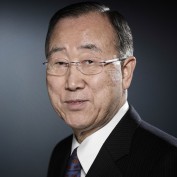
Ban Ki-Moon
Deputy Chair of The Elders; Former Secretary-General of the United Nations
The Elders Foundation
Mr Ban Ki-moon, former UN Secretary-General and Deputy Chair of The Elder
Ban Ki-moon is a former UN Secretary-General, former South Korean Foreign Minister and current Deputy Chair of The Elders – a group of independent leaders brought together by Nelson Mandela – known for championing the world’s vulnerable by putting Sustainable Development, climate change, and gender equality at the top of the UN agenda.
A global advocate for climate action, equality and justice and ethical leadership, Ban Ki-moon joined The Elders in June 2017 after completing his second term as UN Secretary-General. In October 2018, he was appointed Deputy Chair together with Graça Machel and under the leadership of Chair Mary Robinson.
Ban Ki-moon served as the 8th Secretary-General of the United Nations from 2007 to 2016, succeeding Kofi Annan. His first major initiative as UN Secretary-General was the 2007 Climate Change Summit, which was followed by extensive diplomatic efforts to put the issue at the top of the global agenda. In 2009, Mr Ban continued to stress his concerns for global warming at the World Climate Conference in Geneva, and in 2014 he joined demonstrators in the People's Climate March in New York City. He also called together world leaders for the 2014 UN Climate Summit, which served as a preparatory meeting for the 2015 United Nations Climate Change Conference.
Mr Ban was a tenacious advocate for the Millennium Development Goals and their successors, the Sustainable Development Goals. He generated more than $60 billion in pledges, with a special emphasis on Africa and the new Global Strategy on Women’s and Children’s Health.
Ban Ki-moon was a strong advocate for the creation of UN Women. His advocacy for women’s rights and gender equality led him to launch the "Unite to End Violence against Women" campaign; the "Stop Rape Now" initiative; the creation of a "Network of Men Leaders"; and the establishment of a new Special Representative on Sexual Violence in Conflict. Within the UN itself, Mr Ban increased the number of women in senior management by 40%, reaching the highest level in the organisation’s history.
As Secretary-General, Ban Ki-moon implemented significant UN reforms, including measures aimed at making the organisation more transparent, effective and efficient. He also strengthened UN peace efforts by promoting a series of steps aiming at improving the impact of the 120 000 United Nations "blue helmets" operating in the world’s conflict zones. He set up a mediation support unit, which, together with the Secretary-General’s good offices, helped to prevent, manage and resolve tensions, conflicts and crises. Particularly, he took steps to bring accountability for human rights violations through inquiries related to Gaza, Guinea, Pakistan and Sri Lanka, legal processes in Lebanon and Cambodia, and advocated the "responsibility to protect”.
29
Jan
Closing Session
PREVIOUS WEBINARS
14.00 - 14.45 (BKK)

